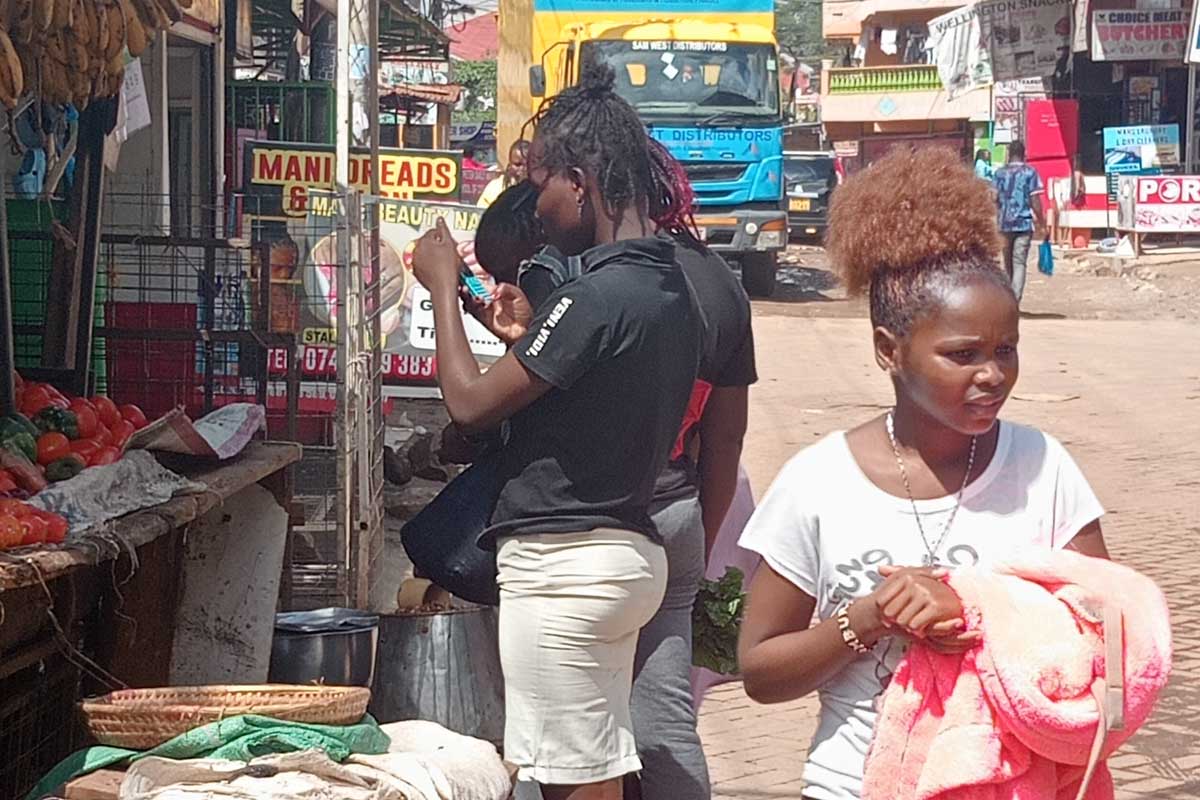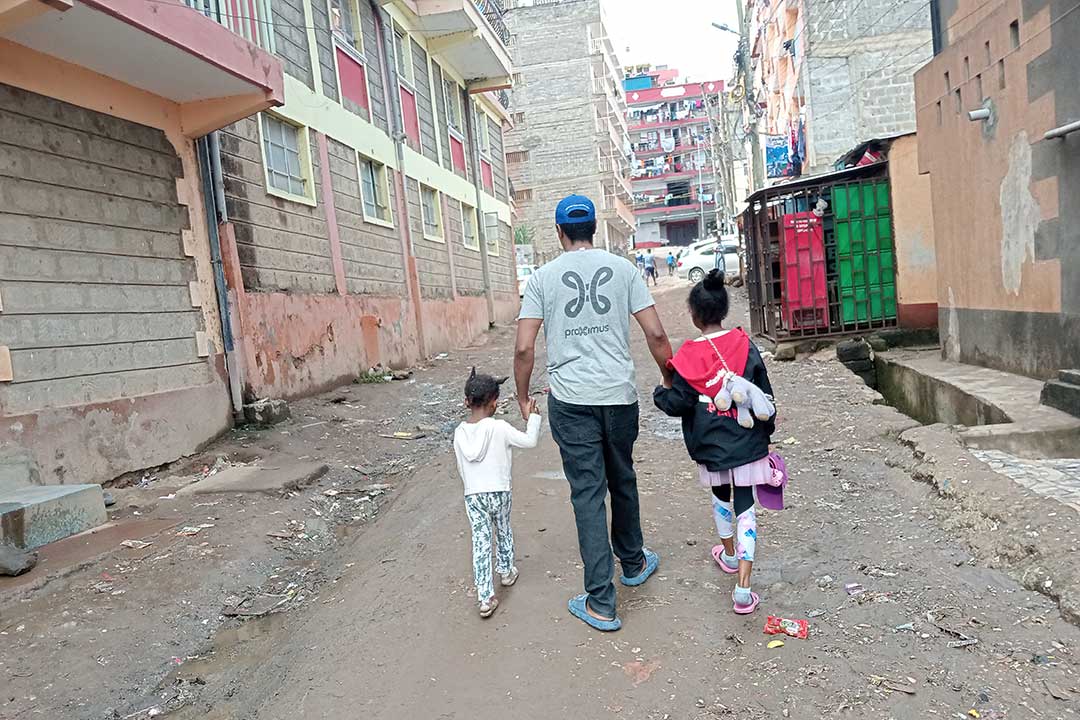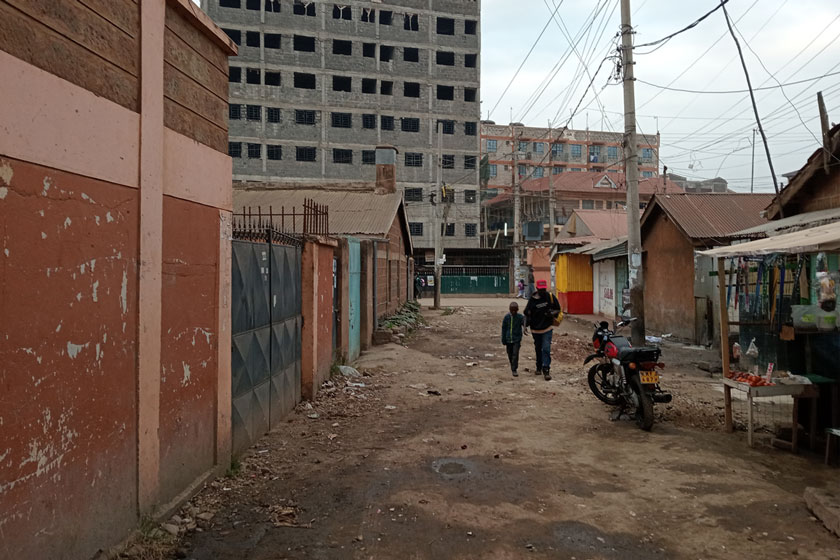The unseen shield: community health workers on Kenya’s immunisation frontier
Wanjiku Kamau’s job sits at the complicated intersection of social work and medical care – and for her, it comes with a deeply personal sense of mission.
- 19 May 2025
- 6 min read
- by Gitonga Njeru

The midday sun beat down, and ochre dust swirled around Wanjiku Kamau’s worn-out black sandals as she navigated the narrow, winding paths of the neighbourhood. A small, insulated carrier swung gently at her side, holding the precious cargo that represented hope and protection for the community’s youngest members.
Kamau is a community health worker (CHW), a vital yet often unsung hero in the fight against preventable diseases in even the remotest corners of Kenya. Her work is a tapestry woven with threads of compassion, resilience, and the quiet determination to safeguard the health of her neighbours.
For Kamau, this mission is deeply personal, shaped by the memory of her younger sister Amina, who succumbed to measles a number of years ago – a loss that fuels her unwavering commitment to educate caregivers about the life-saving benefits of vaccines through workshops and regular home visits.
Forging trust
Her first stop is the homestead of a respected figure in the Zimmerman Estate community of Nairobi who had initially harboured deep scepticism about vaccines. Zimmerman Estate is located in Kasarani Sub County, northeast of Nairobi’s Central Business District.
The resident in question harboured deep traditional and religious beliefs, which, in contact with whispers of misinformation that had trickled into the community, had created a wall of scepticism about vaccination. Kamau remembers her first few conversations with the woman, filled with gentle persuasion and patient explanations.
“The neighbour would not agree for her children to be vaccinated,” Kamau recalls. “Instead of me using the law to report her, I decided to convince her.
“She eventually got convinced with the benefits of vaccination. Her two children were vaccinated against polio. It was not easy.”
The woman’s turning point came during a recent measles outbreak scare in a neighbouring village, Kamau says. The stories of sick children, the fear in the eyes of parents, resonated deeply with the young mother. But witnessing her ongoing apprehension, Kamau decided to share her own story, recounting the raw pain of losing her sibling.
“I saw my sister weaken day by day,” Kamau recalls, her voice softening. “The fever, the rash… there was nothing we could do. These vaccines, they prevent that suffering. They are a gift of protection.”
She spoke of how the vaccines work in a community and how they strengthen the body’s natural defences. She spoke with her characteristic passion. Eventually, trust blossomed.
“I love my job with passion”
Kamau continues her day’s rounds through the communities she serves. She is met by one of her clients – a prominent figure known as Mama Kilome who greets Kamau with a warm smile, her youngest grandchild, baby Kofi, nestled securely in her arms, his vaccination card proudly presented.
“I love my job with passion, as I feel very motivated when I can save the life of a human being. Especially that of a child,” says Kamau.
Next, Kamau’s path leads her to Onyango Otieno, who resides in Marurrui slum, just a stone’s throw away from Zimmerman. He is an influential elder whose views on health are deeply rooted in tradition, and who, as such, relies by default on the opinion of Phillip Wesanga, the slum’s respected traditional healer.
Approaching the subject of Wesanga is a delicate matter. Kamau understands the importance of cultural sensitivity and seeks to build bridges rather than create divides.
Otieno’s face is etched with the wisdom of years, and sharp with attention. He listens intently as Kamau explains the immunisation programme. He speaks of the balance of nature, of traditional remedies passed down through generations. While his scepticism towards modern medicine remains, he acknowledges the devastating impact of illnesses like measles.
“I managed to convince him [to change his mindset and vaccinate his children], but with a lot of effort and time,” Kamau reports, following the conversation. The dialogue is ongoing, a slow dance of understanding and respect. Kamau hopes that by demonstrating the tangible benefits of vaccination, she can gradually earn trust and perhaps even foster a degree of collaboration.
“Despite me loving my job, the government should increase our remunerations. We work under very difficult conditions. Sometimes we face physical violence, verbal abuse and stigma from the community. The government should make considerations,” says Kamau, looking exhausted.
Beacon of acceptance
Kamau finds a beacon of acceptance at Wairimu Githuka’s homestead. Githuka, a young mother who values education and readily seeks information, embraced vaccination for her children without reservation.
“I want the best for my children,” Githuka explains, holding her healthy toddler. “I learned about vaccines during my antenatal classes. They protect and save the lives of my children and give them a chance to grow strong and healthy. Wanjiku has been wonderful in ensuring all their doses are up to date.”
Have you read?
Part of the system
Beyond the individual-level interactions, Kamau’s work also plugs into the broader health system. The County Medical Officer of Health’s office relies heavily on the information and outreach work provided by CHWs like Kamau.
“Our community health workers are the eyes and ears on the ground,” said Dr Irene Muchoki, Nairobi County Health Officer. “They reach families in the most remote areas, building trust and providing essential health education. Their efforts directly translate to higher immunisation coverage.
“CHWs play a key role in educating and engaging their community about the importance of vaccinations, particularly in light of vaccine-preventable diseases that have recently affected their area,” she added. “They are instrumental in bridging the gap between healthcare facilities and communities, addressing misinformation and ensuring that every child has access to life-saving vaccines.”
While specific figures for Marurrui are difficult to obtain, broader statistics paint a picture of the impact of CHWs. For example, a study by Living Goods indicates that digitally empowered CHW programmes have been linked to a significant increase in full vaccination rates, from 43.9% in 2019 to 74% in 2021 in some areas (Gavi, 2023).
Dr Patrick Amoth, the Director General of Health at the Ministry of Health, recognises the pivotal role of CHWs in Kenya’s national immunisation strategy.
“Community health workers are the backbone of our primary healthcare system, particularly in reaching our ambitious national immunisation targets,” Dr Amoth stated during a recent health conference.
“Their dedication and tireless efforts in educating communities, dispelling myths and delivering essential health services, including vaccination, are invaluable. Investing in and strengthening our CHW programmes is crucial for achieving universal health coverage and protecting our children from preventable diseases.”
Dr Rose Jalango, Head of the National Vaccines and Immunization Program, provided further context. “CHWs are at the forefront of educating and engaging their community about the importance of vaccinations, particularly in light of vaccine-preventable diseases that have recently affected their area,” said Dr Jalango.
“They play a critical role in addressing vaccine hesitancy and ensuring that accurate information reaches the community.”
The work of Kamau and her fellow CHWs is often challenging. They face logistical hurdles, traversing difficult terrain, and sometimes encountering resistance and deeply entrenched beliefs. Yet, their dedication remains unwavering, fuelled by the profound impact they witness – healthy children playing, families spared the anguish of preventable illness and communities growing stronger.
As Kamau continues her rounds, the small carrier on her side feels heavier than its physical weight suggests. It carries the weight of responsibility, the weight of hope and the unseen shield that is slowly but surely protecting Kenya’s most vulnerable, one child, one conversation, one village at a time.







